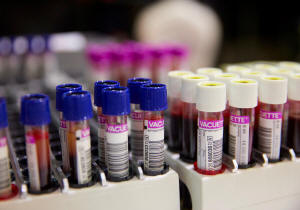Predictive value of 'good' cholesterol level varies by race, U.S. study
finds
 Send a link to a friend
Send a link to a friend
 [November 22, 2022]
By Nancy Lapid [November 22, 2022]
By Nancy Lapid
(Reuters) - The widely-held concept that
levels of "good" cholesterol in the blood can indicate heart disease
risk is not equally true for Blacks and whites, and the measure itself
may be of less value than previously thought, according to a U.S. study
published on Monday.
Various types of cholesterol are thought to have either healthy or
unhealthy effects.
Low levels of so-called "good" high-density lipoprotein (HDL)
cholesterol were linked with higher odds for developing cardiac problems
in the long-term study - but only in white participants, the study
published in the Journal of the American College of Cardiology found.
In contradiction to what has generally been assumed, low HDL levels did
not confer any higher risk of heart disease in Black people, researchers
said. Among white people, however, those with HDL levels below 40
milligrams per deciliter had a 22% higher risk for coronary heart
disease compared with those whose HDL levels were higher.

High HDL levels (above 60 mg/dL), which are thought to be protective,
were not linked with lower coronary heart disease risks in either race,
researchers found.
"Typically at the doctor's office, those of us with higher HDL levels
get a pat on the back" for being at lower risk, said study leader
Nathalie Pamir of Oregon Health & Science University in Portland. "Now,
instead of giving a pat on the back to people with high HDL, doctors
should do nothing, or say, 'We don't know what this means.'"
High levels of "bad" low-density lipoprotein (LDL) cholesterol,
typically treated with widely-used statins such as Lipitor, and
triglycerides were associated with increased heart disease risks in both
races, her team found.
[to top of second column]
|

Samples of blood are pictured during a
blood donation event in the closed MAD (Moulin a Danse) night club
during the outbreak of the coronavirus disease (COVID-19) in
Lausanne, Switzerland, December 7, 2020. REUTERS/Denis Balibouse/File
Photo
 The study, funded by the National
Institutes of Health, collected data over roughly 10 years from
nearly 24,000 U.S. adults, about 42% of whom were Black.
Participants of both races were similar in age, cholesterol levels,
and other heart disease risk factors, the researchers said.
The early studies that shaped perceptions about healthy cholesterol
levels overwhelmingly involved white American participants, Pamir
said. "Our study puts a big question mark on the available
biomarkers that we use to assess risk because they were developed
without having all races in mind."
Dr. Keith Ferdinand of Tulane University in New Orleans, who was not
involved in the research, warned in an editorial that using HDL
cholesterol levels to estimate risk "could inaccurately assess and
possibly misclassify (coronary artery disease) risk in Black adults
and become a barrier to optimal care."
Better estimates might be obtained, Ferdinand wrote, by measuring
the amount of calcium that has accumulated in patients' arteries and
monitoring their levels of a form of cholesterol called Lp(a).
In all cases, he added, regardless of biomarker levels, "therapeutic
lifestyle changes are the bedrock of prevention."
(Reporting by Nancy Lapid; Editing by Bill Berkrot)
[© 2022 Thomson Reuters. All rights
reserved.] This material may not be published,
broadcast, rewritten or redistributed.
Thompson Reuters is solely responsible for this content.
 |